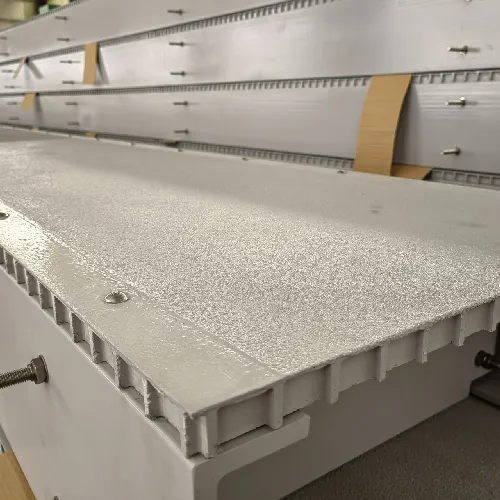loading...
- No. 9, Xingyuan South Street, Dongwaihuan Road, Zaoqiang County, Hengshui, Hebei, China
- admin@zjcomposites.com
- +86 15097380338
- Welcome to visit our website!
High-Quality Fibre Reinforced Plastic Tanks for Durable Storage Solutions
Fiber Reinforced Plastic Tanks An Innovative Solution for Storage
In today's industrial landscape, the need for durable, lightweight, and corrosion-resistant storage solutions has led to the widespread adoption of fiber reinforced plastic (FRP) tanks. These tanks, engineered using composite materials that fuse plastic with reinforcing fibers—usually glass or carbon—offer a plethora of advantages over traditional storage solutions made from metal or concrete.
Durability and Corrosion Resistance
One of the most significant benefits of FRP tanks is their exceptional resistance to corrosion. Unlike metal tanks, which can succumb to rust and require costly maintenance, FRP tanks remain impervious to corrosive substances, including acids and alkalis. This property makes them an ideal choice for industries such as chemical processing, wastewater treatment, and petroleum storage, where the contents can be highly corrosive. The longevity of FRP tanks significantly reduces lifecycle costs, making them a cost-effective solution over time.
Lightweight and Versatile
The lightweight nature of FRP also presents several advantages. These tanks are considerably lighter than their metal counterparts, which simplifies transportation and installation. This characteristic can be particularly beneficial in remote locations where heavy equipment is not easily accessible. Moreover, the versatility of FRP allows for tanks to be manufactured in various shapes and sizes, tailored to meet specific storage needs. This customization capability enables industries to maximize space efficiency and optimize operational workflows.
Insulation and Temperature Regulation
fibre reinforced plastic tanks

Another noteworthy feature of fiber reinforced plastic tanks is their excellent thermal insulation properties. The composition of FRP can help maintain the temperature of stored materials, minimizing the risk of heat transfer that could lead to spoilage or degradation, especially in the food and beverage industries. This quality is particularly advantageous for companies managing temperature-sensitive products or chemicals, as it enhances safety and product integrity.
Sustainability and Environmental Impact
Furthermore, FRP technology can contribute to sustainability efforts. Many manufacturers are now incorporating recycled materials into the production of fiber reinforced plastics, reducing the environmental impact associated with traditional materials. Additionally, the durability and longevity of FRP tanks lead to a decrease in waste generated from replacements and repairs.
Compliance and Safety Standards
When it comes to compliance, FRP tanks can be engineered to meet various industry standards and regulations, ensuring that they can safely store hazardous materials. The future of storage solutions increasingly focuses on safety, and FRP tanks address this issue through robust design and testing, which includes resistance to leaks and spills, protecting both the environment and public health.
Conclusion
In summary, fiber reinforced plastic tanks represent a cutting-edge solution for industrial storage needs. With their unique combination of durability, lightweight structure, corrosion resistance, and thermal properties, they are well-suited for a multitude of applications across diverse industries. As the demand for efficient and sustainable storage solutions continues to grow, FRP tanks stand out as a forward-thinking option that meets both economic and environmental needs, ensuring safety and reliability for years to come.
-
GRP Structures: The Future of Lightweight, High-Performance EngineeringNewsJun.20,2025
-
FRP Water Tank: High-Performance Storage for Corrosive and Clean Water SystemsNewsJun.20,2025
-
FRP Square Tube: The New Industry Standard for Chemical and Structural ApplicationsNewsJun.20,2025
-
FRP Pultruded Profiles: The Ultimate Choice for Lightweight Structural StrengthNewsJun.20,2025
-
FRP Handrails: The Safer, Smarter, and Stronger Choice for Modern InfrastructureNewsJun.20,2025
-
FRP Grating: The Smart Solution for Durable, Lightweight Industrial FlooringNewsJun.20,2025
-
Why Choose a Galvanized Water Tank for Your Storage NeedsNewsMay.21,2025
